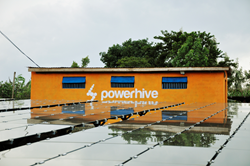Powerhive East Africa has achieved something no other private company has done – been given permission to generate, distribute and sell electricity to the Kenyan public beginning in Kisii and Nymaira counties in Western Kenya. Using microgrids, the company, a subsidiary of Powerhive, Inc., will directly deliver electricity to hundreds of rural communities that are beyond the reach of the national grid.
For more than two years, Powerhive has been operating microgrid pilot projects utilizing 100 percent renewable energy in four villages in Kisii, Kenya. The pilot projects serve approximately 1,500 people and have played a critical role in creating new businesses, enabling the use of productive appliances, powering schools, and displacing kerosene and diesel, which emit toxic pollutants.
According to Powerfhive, the Kenya Energy Regulatory Commission’s (ERC) decision to provide a concession to an off-grid utility company reflects the beginning of a global transformation in the energy sector. “The Powerhive permit was granted in recognition of the fact that grid expansion is not always the most economical choice to expand energy access; off-grid alternatives have a role to play,” wrote Dr. Frederick Nyang, director of economic regulation for the Kenya ERC, in a letter. “[Powerhive has demonstrated] that its microgrids are capable of operating in compliance with the prescribed standards for residential and commercial electricity service provision.”
 Historically, explains Powerhive, governments have pursued rural electrification almost exclusively through major public investments in grid expansion. Through its distributed energy delivery solutions, Powerhive aims to complement such government and utility efforts by focusing on areas that are too costly for grid extension. Powerhive East Africa’s concession, and the resulting deployment of microgrid projects, will set the stage for rapid global expansion and support Kenya’s goal of electrifying 100 percent of the population by 2030.
Historically, explains Powerhive, governments have pursued rural electrification almost exclusively through major public investments in grid expansion. Through its distributed energy delivery solutions, Powerhive aims to complement such government and utility efforts by focusing on areas that are too costly for grid extension. Powerhive East Africa’s concession, and the resulting deployment of microgrid projects, will set the stage for rapid global expansion and support Kenya’s goal of electrifying 100 percent of the population by 2030.
“The government of Kenya recognizes that the fastest and least expensive approach to reach 100% electricity access is to allow private investment in distributed generation infrastructure,” said Powerhive East Africa’s Managing Director Zachary Ayieko. “Other national governments aggressively pursuing rural electrification targets can also benefit greatly by using Powerhive’s energy access solution.”

